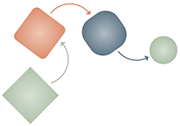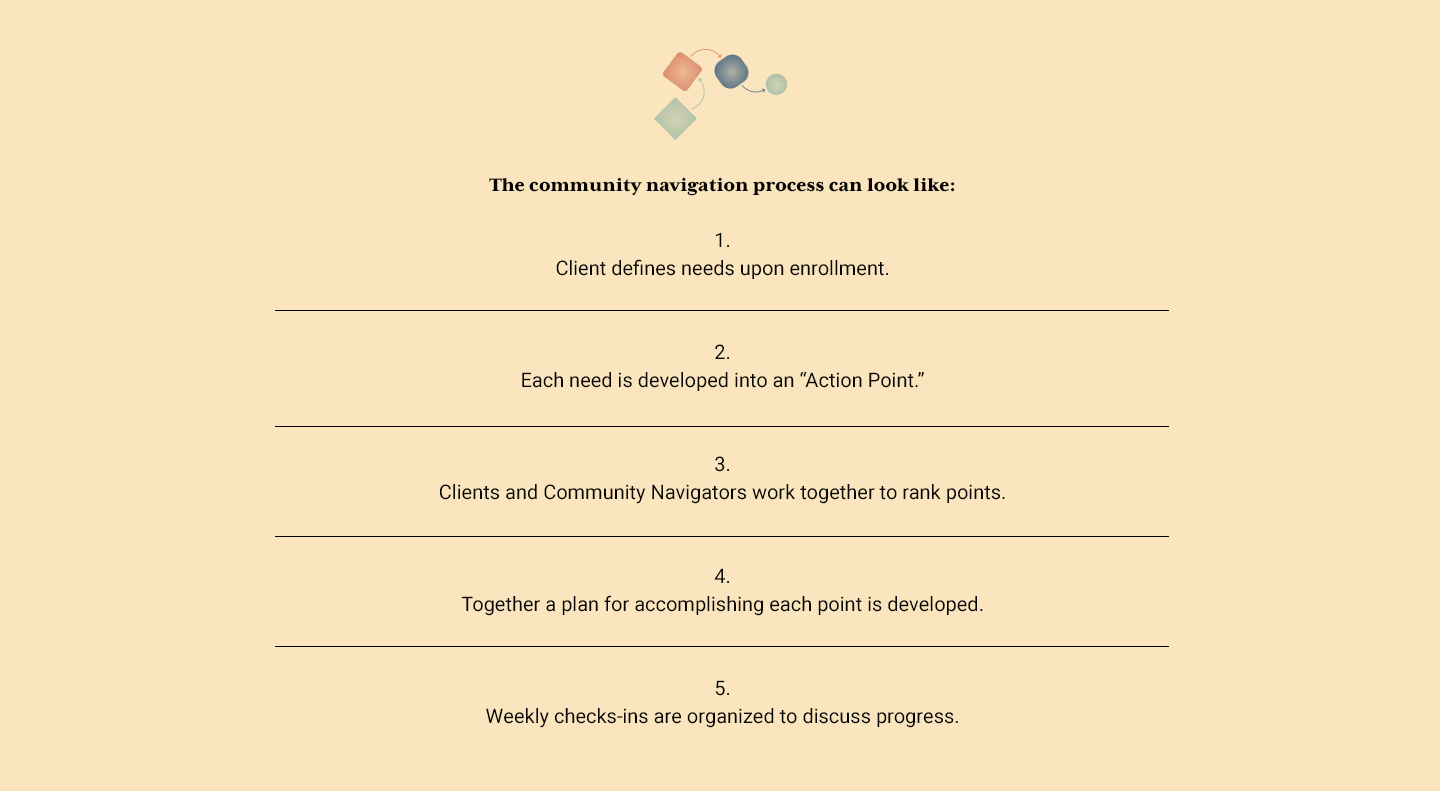
Western North Carolina AIDS Project
So I have to say honestly in terms of success stories, every partner that we work with, I look at it as a success story. The fact that our participants are coming in, that we're seeing so many visitors, we saw almost 1,600 visitors last month… If you're a participant, if you wanna use drugs, we're not going to tell you ‘that's wrong.’ We're not gonna tell you ‘it's bad.’ We're gonna tell you, ‘we're going to support you to be as safe as possible," and if you're willing to carry Narcan, if you're willing to come in and get unused needles on a regular basis, if you're willing to maintain your health and worry about your health and let us do our best to keep you as safe as possible, that's a success story.
Highlights:
- WNCAP, an AIDS Service Organization, was able to draw upon their existing Ryan White case management model to create their Community Navigation program for SSP participants.
- They utilize a bi-level program enrollment model. A participant is provided with harm reduction supplies, education, and HIV/HCV testing. Those who want more intensive services are enrolled as a client and offered 1:1 case management and navigation.
- WNCAP prioritizes hiring navigators from the community who have lived experience with substance use. Firsthand knowledge of local systems of care gives staff credibility and can help in building trust with participants.
- Patient navigation resources were used to customize and maintain an existing mobile unit so it could better accommodate supplies provision and community navigation. This is crucial in rural western North Carolina where services are primarily delivered by mobile outreach.
Program Overview
The Western North Carolina AIDS Project (WNCAP) was founded in 1986 as an AIDS Service Organization (ASO) by a small group of committed volunteers during the early years of the AIDS epidemic. WNCAP is located in Asheville, North Carolina, and serves a largely mountainous region in south-central Appalachia that includes thousands of people across 18 counties, including counties designated as rural by the Federal Office of Rural Health Policy, the Qualia Boundary of the Eastern Band of Cherokee Indians, and CDC-designated HIV/HCV vulnerable counties. Their scope spans state lines; WNCAP provides services to people living in 4 Appalachian states.
In the 1990s, WNCAP developed HIV prevention education and Ryan White case management. Later, WNCAP added harm reduction and pharmacy services. WNCAP’s SSP offers overdose education and naloxone distribution, safer injection and smoking supplies and education, HIV/HCV testing and treatment referral, and community navigation. The patient navigation program at WNCAP is referred to as Community Navigation, in response to staff and participant preference to avoid the potential negative connotations of the word “patient.” The SSP has five paid staff and operates out of two fixed sites and four mobile sites in western North Carolina. With funding from the patient navigation project, WNCAP employed two case managers, each of whom are based at a brick-and-mortar site.
WNCAP utilizes a bi-level enrollment model, in which individuals can be enrolled as participants or clients based on their needs and desires. A participant is considered a lower intensity of engagement and will be provided overdose education and naloxone, safer injection and smoking supplies and education, and HIV/HCV testing. Those who would like more intensive services can be enrolled as a client and offered 1:1 care and case management modeled after WNCAP’s existing Ryan White case management system. The navigator develops a client-centered action plan, manages relevant appointments and resources, provides transportation to and from appointments, and offers peer support opportunities.
Two important components of WNCAP’s navigation approach are:
- Timing – moving to address client goals immediately has shown to be a great way to build momentum. Starting with an action point that can be accomplished quickly builds relationships and confidence.
- Client-led services – clients know what they need and want to address those issues. It’s important to let the client set priorities and avoid trying to “help” by projecting your own opinions.
Community navigation services include connection to HIV/HCV treatment, food assistance, resume and job-seeking assistance, obtaining an ID, volunteer opportunities, benefits application, phone/technology resources, insurance navigation, primary care, and MAT. The bi-level program enrollment is open to all, and there is no cap on the number of clients. The community navigators and staff can meet people where they are to provide relevant, comprehensive, non-stigmatizing services to community members at the desired level, which may change over time.
Project Impact
WNCAP has excelled at retaining participants through the organization’s emphasis on being a trustworthy support service for participants. To preserve participant trust and comfort, WNCAP prioritizes filling staff vacancies quickly, hiring community members with lived experience. Programs that serve people who use drugs are not always enough to gain participant trust unless the program is staffed with people who can understand and empathize with participants' experiences. WNCAP ensures their navigators are given tools to become Peer Support Certified in the state of North Carolina (NCCPSS) and certified to provide rapid HIV/HCV testing. The emphasis WNCAP places on building trust between navigators and participants has proven effective in providing services to “high needs” participants, many of whom have received services multiple times from other organizations but always fell out of care. In contrast, throughout the implementation of patient navigation, WNCAP has seen higher rates of consistent participation among participants who have struggled to access services in the past.
WNCAP serves a primarily rural area where transportation is limited, which necessitates a mobile service delivery model. In order to more efficiently serve participants during mobile outreach, WNCAP dedicated patient navigation resources to customize their existing mobile unit.
Project Challenges
Like all SSPs, WNCAP has struggled with the challenges presented by the COVID-19 pandemic—shifting services to mobile and outdoor delivery, developing new safety protocols for staff and participants, navigating changes in service availability (in particular limited access to shelter) and new requirements and restrictions. WNCAP has also faced challenges related to systemic barriers to care, such as a shortage of medical providers in rural western North Carolina, including MAT providers, and restrictions on the number of patients that can be treated with buprenorphine during a prescriber’s first year after certification (the “X waiver” requirement was eliminated in 2023, removing patient limits). Many of WNCAP’s participants are uninsured, given the lack of Medicaid expansion in North Carolina (NC only recently expanded Medicaid, in March 2023), and have difficulty finding affordable treatment. Clients without insurance have had to wait weeks for general medical appointments and even longer for MAT.
The substance use disorder treatment that is available is not a good fit for every individual because of religious and/or non-evidence-based abstinence-focused treatment models. WNCAP also noted that the effects of stigma and poor experiences with medical professionals was a significant barrier for participants to access services.
WNCAP has found the biggest gap in their program is the inability to provide emergency financial assistance to clients. As an AIDS Service Organization with Ryan White funding, they are able to provide some limited emergency financial assistance to clients living with HIV/ AIDS to bridge the gap in available funding for housing, food, and medical care. If the same funding was available to support PWUD with short term hotel stays or bridge coverage for MAT, they would be able to assist in the needs of clients more directly in the Community Navigation program.
WNCAP Patient Navigation Encounters (March 2020 – February 2022)
Total Patient Navigation Enrollment - 389
|
Service |
Number of Encounters |
|
MAT |
29 |
|
HIV/HCV Testing & Care |
118 |
|
Primary Medical Care |
54 |
|
Housing |
23 |
|
Detox Services Referral |
8 |
|
PrEP |
1 |
Case Study
WNCAP was visited by a 30-year-old male military veteran injured in combat. He was receiving a monthly pension and Veterans Affairs (VA) benefits. He injected methamphetamine and fentanyl and was unhoused. The client went to WNCAP and enrolled in the 1:1 community navigation program. He worked with his navigator to create an action plan for housing, an upcoming court date, seeking mental health treatment, finding his stolen car, and receiving MAT. After enrolling in community navigation, the navigator tried to find the client shelter for the night but was unable to do so. The community navigation team purchased a tent for the client, who was able to stay in the WNCAP parking lot until the next day, when a partner organization could house them in a local hotel.
The client checked himself out of the hotel about two days later. He returned to use and did not engage with WNCAP for a week. Eventually, he contacted the navigator to start working together again. The community navigator was able to locate and return the client’s car. Over the next several months, the navigator worked with the client on multiple priorities while he pursued various substance use treatment options. The client was supported to make and attend a VA medical appointment and to attend his court appearance.
After moving into a sober living facility, then checking out and deciding to try MAT instead (which he accessed via telehealth appointment at the WNCAP office), the client finally entered a long-term sober living facility with his community navigator’s support. Over the next year, he remained in recovery and is still in contact with WNCAP for peer support services. He has a full-time job and an apartment.
Takeaways and Next Steps
WNCAP was able to leverage existing infrastructure, in particular the Ryan White case management model, to establish a peer-led Community Navigation Program for SSP participants. WNCAP developed an approach that allowed participants to choose the level of intensity of their engagement with services. During year one of the project, WNCAP invested in upgrading their mobile unit and significantly expanded mobile services. Throughout year two, WNCAP was able to move from initial implementation to quality improvement, with a focus on refining the patient navigation intake process, standardizing procedures and forms, and improving efficiency. WNCAP continues to provide patient navigation and partner with clients to make any positive change, one action point at a time.

